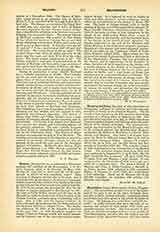

Maine de Biran, FRANCOIS—PIERRE—GONTHIER, philosopher; born at Grateloup near Bergerac, Dordogne, France, November 29, 1766; died at Paris, July 16, 1824. He studied at Perigueux, joined the army, but after a few years resigned and entered politics. In April, 1797, he was one of the Conseil des Cinq Cents; however, as he incurred the hostility of the Directory by his royalist sympathies he withdrew to Grateloup, where he devoted himself to philosophy. His constitution was delicate and sensitive and his philosophic bent had already manifested itself by his observations on the influence of the physical state on the moral. As an ideologist he won the prize at the Institut with his essay “Sur l’habitude” (1802); but his “Decomposition de la pensee” (1805) shows him deviating from the theory of that school, and in “La perception immediate” (1807), and “Rapports du physique et du morale de l’homme” (1811), he is an opponent of the eighteenth-century philosophy. He then reentered the political arena and was elected to parliament in 1812, 1815, and 1820. In his latter days his tendency to mysticism gradually brought him back towards practical Christianity, and he died a faithful child of the Church. Three stages mark the development of his philosophy. Up to 1804, a stage called by Naville “the philosophy of sensation”, he was a follower of Condillac’s sensism, as modified by de Tracy, which he soon abandoned in favor of a system based on an analysis of internal reflection. In the second stage—the philosophy of will—1804-18, to avoid materialism and fatalism, he embraced the doctrine of immediate apperception, showing that man knows himself and exterior things by the resistance to his effort. On reflecting he remarks the voluntary effort which differentiates his internal from his external experience, thus learning to distinguish between the ego and the non-ego. In the third stage—the philosophy of religion—after 1818, we find de Biran advocating a mystical intuitional psychology. To man’s two states of life: representation (common to animals), and volition (volition, sensation, and perception), he adds a third: love or life of union with God, in which the life of Divine grace absorbs representation and volition. Maine de Biran’s style is labored, but he is reckoned by Cousin as the greatest French metaphysician from the time of Malebranche. His genius was not fully recognized till after his death, as the essay “Sur l’habitude” (Paris, 1803) was the only book that appeared under his name during his lifetime; but his reputation was firmly established on the publication of his writings, partly by Cousin (“Oeuvres philosophiques de Maine de Biran”, Paris, 1834-41), and partly by Naville (“Oeuvres inedites de Maine de Biran”, Paris, 1859).
A. A. MACERLEAN

